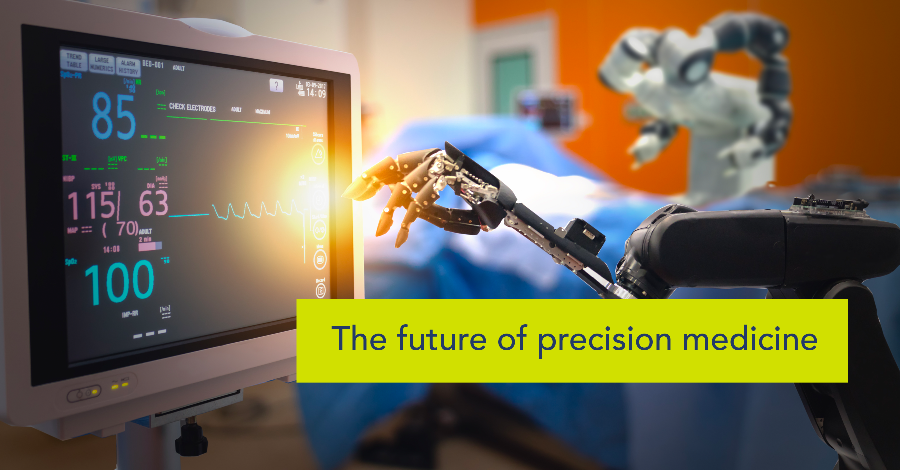The future of precision medicine

The sequencing of the human genome heralded a potential revolution in healthcare. So much so that in 2000, Francis Collins, the US lead on the Human Genome Project and the current director of the National Institutes of Health (NIH), predicted a complete transformation in therapeutic medicine over the next 15 to 20 years.
In fact, Collins’ 1999 article on the ‘Medical and Societal Consequences of the Human Genome Project’ in The New England Journal of Medicine is sometimes referenced as the aspirational template for the precision medicine movement.
So, how has precision medicine fared over the two decades since those aspirations were first recorded?
A 2020 white paper published by The Economist Intelligence Unit based on extensive interviews and literature reviews summed up the advances in precision medicine as limited but highly promising. Much of the progress, according to the paper, was concentrated in genomic medicine with the trend expected to continue into the foreseeable future. Oncology and rare disease were deemed to have progressed the most, trailed by pharmacogenomics and pathogen identification.
Oncology, in particular, is emerging as the paragon of the transformative potential of precision medicine by demonstrating value in three key areas of clinical oncology – screening and confirmatory diagnostic testing, drug development, and treatment selection. In terms of screening and testing, genetic assessments of at-risk individuals have significantly improved the identification of cancer-predisposing mutations with new studies suggesting that expanding these assessments with NGS techniques could dramatically enhance the power of screening.
The classification of tumours on the basis of specific genetic mutations rather than tissue of origin has helped improve patient stratification and differential diagnosis.
The subsequent focus on the discovery of small molecules that target these specific mutations is expanding the therapeutic index of chemotherapy. Between 2018 and 2019, the US FDA approved 36 new molecular entities for personalised treatments, 14 of which were for some form of cancer. Today, there are a range of precision oncology medicines – including monoclonal antibodies (mAbs), CAR T-cell-based treatments, targeted immunotherapies – that have either already been launched or are in advanced stages of clinical development.
Finally, molecularly guided diagnostics and treatments are not only demonstrating the potential to improve outcomes relative to non-targeted interventions such as surgery, radiation, and chemotherapy alone, but have also significantly improved patient survival even in previously untreatable cancers.
Oncology provides us with a potent proof-of-concept that can help accelerate the expansion of precision medicine across therapeutic areas of healthcare. At BioStrand, we believe that precision medicine has to concurrently evolve across three key dimensions before its full potential can be realised at scale.
Evolving beyond oncology
Now that we have valuable insights from oncology’s approach to precision medicine, the focus now has to be on applying these insights to other fields of medicine. There are several areas, such as diabetes, obesity, neuroscience, immunology, women’s health, and several infectious diseases, that can significantly benefit by transitioning to a holistic, stratified, and personalised healthcare framework.
The primary emphasis has to be on enabling a full-scope model of precision medicine that seamlessly extends across screening/diagnostic testing, targeted drug development, and molecularly guided treatment.
Though the oncology experience can help define the fundamental principles of applied precision medicine, the challenge will be in fine-tuning the approach to the complexities and characteristics of individual diseases. For instance, immunologic illnesses will require a systems biology approach to identify cell-type and disease state-specific targets that might not be possible with simple genomic/proteomic models.
Precision medicine in the area of women’s health will have to be rooted in a deeper understanding not only of health issues specific to women but also of how specific conditions affect men and women differently.
The bottom line is that the success of applied precision medicine in any field will require sophisticated next-generation tools and technology that can help us build a granular and holistic understanding of disease biology.
Evolving beyond genomics
Even though precision medicine is conceptually rooted in genomics, its scope has since expanded significantly to include valuable data points beyond the genome. It is estimated that while genes and medical history account for a mere 30% and 10%, respectively, of an individual’s health, behavioural, socio-economical, physiological, and psychological data account for the remaining 60%.
As a result, the scope of precision medicine has expanded considerably, and it is recognised today as a multi-modal practice that traverses multi-omics data, medical history, social/behavioural determinants, and other environmental factors to accurately diagnose health states and determine therapeutic options at an individual level.
However, to quote from the EIU study, “the other ‘-omics’ haven’t quite caught up”, despite widespread acknowledgement of the value of integrating diverse data points such as the microbiome and proteome.
But the shift is underway and will only be accelerated by the emergence of multi-omics profiling platforms that can integrate all biological layers – including genomics, epigenomics, transcriptomics, proteomics, microbiomics, etc. – to enable the precise pinpointing of key disease nodes at the convergence of these disparate layers and accelerate the discovery of novel targets, endotypes, and biomarkers.
The ability to quickly and seamlessly access, normalise, and integrate heterogeneous biological, medical, and environmental data into a unified multi-omics analytical framework will be a key determinant of how quickly we can shift to a data-inclusive pan-omics precision medicine paradigm.
Evolving beyond reative
Precision medicine in oncology has been a primarily reactive process. However, there are several conditions, such as various neurodegenerative disorders, for instance, where the latency of disease onset can render this approach inadequate. This has shifted the emphasis from a reactive approach to a more predictive and preventive approach to precision medicine.
Risk assessment, a precision medicine technique, can be extremely effective in screening the primary care population, deploying preventive measures and enhancing population health. One multi-institutional study that carried out a systematic risk assessment of the general primary care population for 27 medical conditions found that nearly half exhibited monogenic hereditary and familial level disease risk that required more intensive risk management.
In order to fully realise its potential, genetic testing has to expand beyond its current utility as an indication-based diagnostic tool to a broader non-diagnostic tool for population-level screening. This would usher in a new era of precision public health where DNA-based population screening is used as a predictive approach to risk assessment that enables the early detection of adverse genetic conditions, the prevention and timely treatment of diseases, and contributes to an overall improvement in health outcomes.
The computational challenges of applied precision medicine
Precision medicine is a data-intensive, data-driven undertaking. In fact, the EIU study defines precision medicine “as the potential outcome of four interwoven, data related enablers”. On the one hand, there is the ever-increasing volume of biological and medical data as well as the multiple layers of disparate and diverse health-related data. On the other, is our ability to store and access this data coupled with the need for sophisticated analytical technologies and frameworks that will allow us to extract knowledge and insights from humongous volumes of heterogeneous data.
However, the broad diagnosis seems to be that the humongous volumes of heterogeneous data remain “largely unready to provide the insights on which precision medicine will rely”.
Precision medicine requires advanced, intelligent solutions that are not only capable of scaling across multiple data dimensions, but also provide a unified analytical framework for the holistic assessment of all biological, medical, and health-related information.
As a starting point, these solutions must be data agnostic so that all information pertinent to precision medicine, irrespective of data size, type, or source, can be instantly and effortlessly integrated. A unified analytical framework will eliminate the need for researchers to work their way through individual datasets, domains, and/or biological layers, and enable comprehensive, integrated multi-omics analysis.
And finally, these solutions must be simple and intuitive enough to use even for non-technical researchers in order to broaden access and realise the potential of precision medicine at scale.
Subscribe to our blog:






